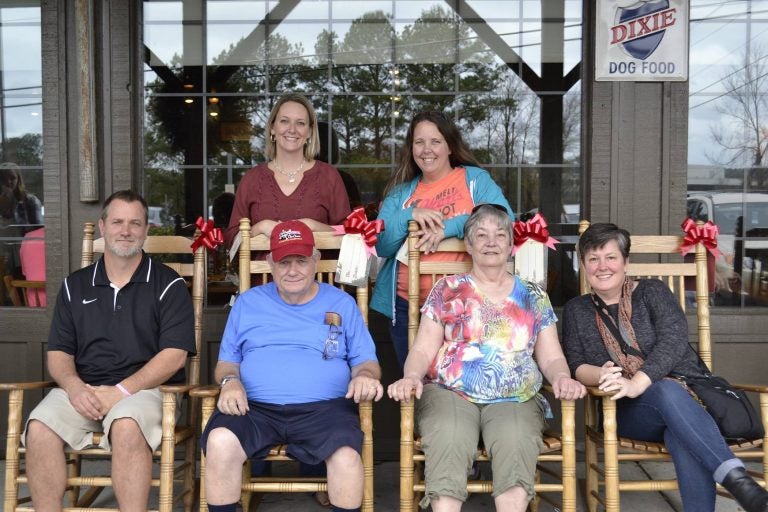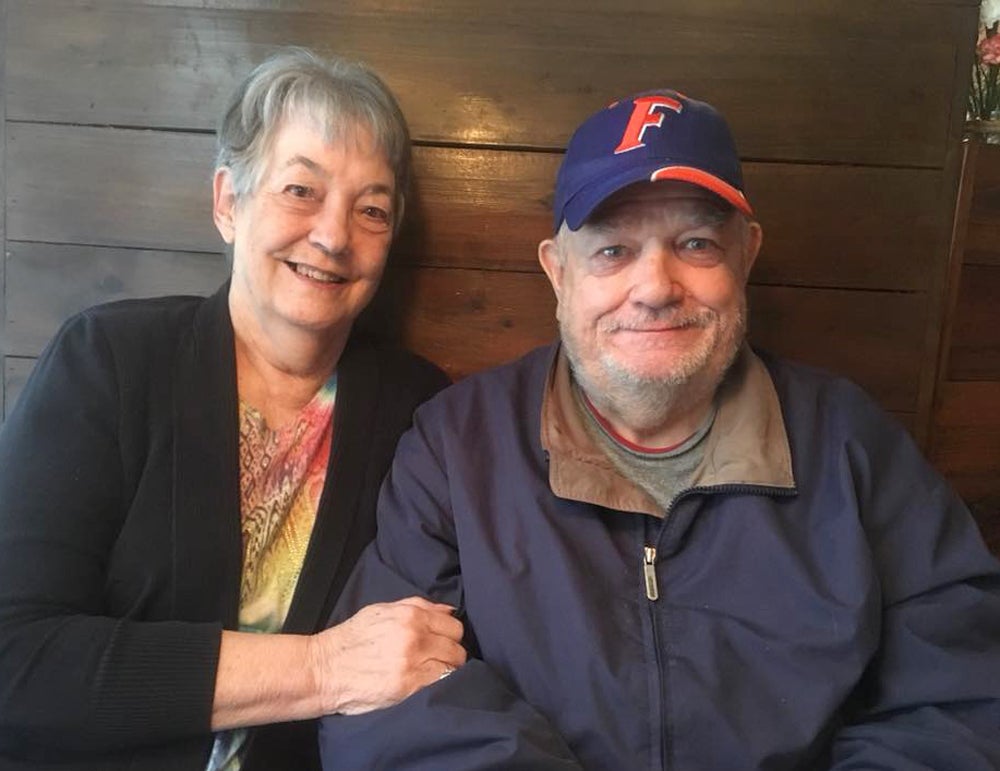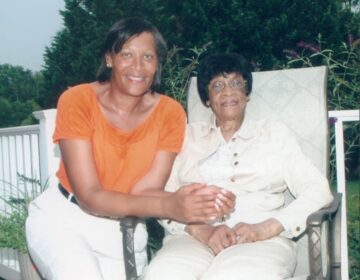Ethicists debate ‘medical aid in dying’ for dementia patients
Lawmakers consider expanding end-of-life options, but not for people with Alzheimer’s disease.
Listen 06:35
Family reunion lunch at Cracker Barrel in Macon, Georgia. Front row (left to right): Thor Ott, Dan Ott, Kathy Ott, Tanya Ott. Back row (left to right): Krista Ott, Danielle Springston. (Image courtesy of Tanya Ott)
Discussing end-of-life medical care can be really difficult for family, but especially so when the terminal condition is something like Alzheimer’s disease and you see the person you love disappearing before your eyes.
Is the person still truly alive? Do they wish they were dead?
It’s a situation my family is confronting. My father, Dan Ott, was diagnosed with Alzheimer’s in 2012, when he was in his mid-60s. What were once quirks became obsessions. He would hide my mother’s purse in the closet because he worried someone would see it through the living room window and break in to steal it. Eventually, he could not figure out how to use a telephone. It was a pretty quick decline, and I was losing the smart, funny guy I loved.

Two years ago, I took my recorder down to Florida hoping to talk to him about his life, before the man I knew slipped away for good. I prompted him with questions about growing up on a farm in Iowa, joining the Air Force during Vietnam, and his four-decade career as a university fundraiser. It did not go well. He was missing huge chunks of his own biography.
“I know some things happened,” he said. “I know they did.”
A few months after that conversation, we moved dad to a memory care unit and he’s still there today. He doesn’t even know that my mom died last fall. We didn’t tell him because we didn’t want him to grieve over and over. But her death has each of us in the family thinking about our end — and how we’d want to navigate it.
Mom had emphysema, and during her last hospitalization she needed a ventilator. Doctors said she’d likely never get off the breathing machine, so Mom, who was very lucid, chose to withdraw treatment. My brother, sisters and I were all with her when she took her last breath.
“I appreciate the fact that Mom chose and had that ability to choose,” says my sister Danielle Springston. “I don’t think Dad would have wanted things to be like they are now.”
“I think with Dad’s situation, it’s entirely different,” says my sister Krista Ott, who is also my father’s health-care surrogate. “He’s not competent to make those decisions, because sometimes he doesn’t even know his own name.”

In six states and Washington, D.C., a doctor can prescribe drugs that will help end a person’s life. Many call it physician-assisted suicide or death with dignity, but lots of people have problems with those terms, so experts have started using the phrase “medical aid in dying.” It’s not an option for people with Alzheimer’s.
To understand why, you have to understand how medical aid in dying works. First, you have to verbally tell a doctor you want it. That starts the clock ticking. Within 15 days, you have to find two doctors who agree you are terminally ill, will likely die within six months, and are competent. Then you have to submit a written request for life-ending medication that has to be witnessed by two people. The doctor holds onto the prescription for 48 hours before snail-mailing or hand-delivering it to a pharmacy.
“When we hand someone life-ending medication, the last official thing we say is, ‘Now, you do understand, Tanya, that when you drink this you will fall asleep, you will slip into a coma, and you will die,” says Sally McLaughlin, executive director of the advocacy group End of Life Washington. “And the problem is [with] a person with dementia, you can’t be sure they understand that.”
Gregory Pence, a bioethicist at the University of Alabama at Birmingham [UAB], says it’s complicated even if people clearly expressed their wishes back when they were competent.
“Let’s suppose I go a year into my diagnosis, and I’m in a locked unit somewhere. My family and the staff see someone who likes the Bee Gees, who likes Breyers ice cream, and the person I used to be hated the Bee Gees and didn’t really like ice cream,” says Pence. “But this looks like a pretty happy person. How could we possibly kill him?”
Even without medical aid in dying, some people with dementia find ways to end their lives on their own terms, says Wendy Walters, the clinical ethics consultant for UAB Hospital. Recently, she reviewed the case of a man diagnosed with early-onset Alzheimer’s. He had helped care for his mother-in-law, who also had the disease. It wasn’t the life the man wanted, so he shot himself and was left with massive injuries.
“It became a very large ethical dilemma for the trauma team,” says Walters, “because the family says he would never want to live like this.”
The family wanted to withdraw life support. Walters supported the plan.
“It was going to be multiple surgeries,” she says. “He would never be able to eat naturally again, and he would have to be tube fed for the rest of his life.”
In another case, Walters says, an elderly woman with Alzheimer’s was reliving the Holocaust, and every moment was terrifying to her. These kinds of cases are causing some ethicists and medical professionals to ask whether health-care systems should offer more options to people with the disease.
My sister and I don’t know whether Dad would have chosen medical aid in dying, but we all are confident he would have at least wanted the option.
“When we have pets and we treat them like our family and we love them and they live in the home with us, when that pet gets to the point where we know that they’re suffering, we are deemed cruel if we do not humanely euthanize them,” says my sister Krista. “And so often we don’t treat our senior citizens, our aging population, with the same respect. We hold on to them. We put them through more medical procedures. We put them in uncomfortable lifestyles that they would not choose for themselves.”
So, she says, in a lot of ways we seem to give animals a lot more respect, comfort and care than we do the people in our lives.
WHYY is your source for fact-based, in-depth journalism and information. As a nonprofit organization, we rely on financial support from readers like you. Please give today.






